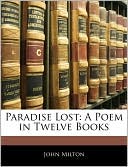

 |

|

The average rating for Paradise Lost based on 1 review is 4 stars.
Review # 1 was written on 2017-11-15 00:00:00 Paul Echols Paul Echols"But words are things, and a small drop of ink, Falling like dew, upon a thought, produces That which makes thousands, perhaps millions, think; 'Tis strange, the shortest letter which man uses Instead of speech, may form a lasting link Of ages; to what straits old Time reduces Frail man, when paper ' even a rag like this, Survives himself, his tomb, and all that's his." If you know anything about Byron, you will know this poem will involve lots of sex, women and Byron/Don Juan getting exactly what he wants from every situation imaginable. He is an anti-hero so he does not possess the standard characteristics a normal hero would; he is not brave or strong, though he is intelligent and cunning; he serves no greater goal and works only for his own survival and self-gratification. And survive he does. He gets out of so many close encounters and near death experiences, often being the only person alive as the plot moves into the next canto. The poetry here feels natural. It's not the sort of verse that a poet has sat down and fussed over in order to achieve the most artistic and creative arrangement of words; it feels like he has written it straight out of his head, completely free flowing, making it almost conversational. Byron was a very selfish man, and that's just part of his poetic persona, so I would go as far to say that this is poetry written for one person: Lord Byron. He wrote it for himself, it is all one big fantasy in which a character, not entirely unlike its author, goes on a long adventure. As such Byron provides the biggest example of an author filibuster I have ever come across; he uses every opportunity available to him to insert his own opinion regarding other writers and critics of the age. He destroys Wordsworth and Coleridge and goads reviewers, informing them that he is going to do more of what they criticised him for just because he can. You have to admire his tenacity and his ability to write whatever he wants regardless of public opinion, which is, essentially, one of the reasons he became so popular to begin with. "Why do they call me misanthrope? Because They hate me, not I them." This is very much Byron's poem. It goes on massive tangents as the plot disappears for stanza upon stanza whilst Byron addresses all sort of random issues. And this, in part, is what makes the work so delightfully clever. It's what you would expect from Byron. He set out to write his own epic, and by the standards of his own overbearing personality, if he wrote anything less than what he did here it would have been a failure. He even says a few things that would pre-date the modernists: "Tis strange,-but true; for truth is always strange; Stranger than fiction: if it could be told, How much would novels gain by the exchange! How differently the world would men behold!" Byron is so just so ridiculously entertaining to read. The plot of this poem is just beyond what you would expect from a poem. We have men forced into cannibalism, the central character disguised as a woman in order to survive, and, above all, so much revealing honesty about his own perceptions. To relate back to the quote I added at the start, this poem holds so much of Byron's authorial persona and it certainly did survive him: it made him immortal. Come read this and learn exactly who Byron was. |
CAN'T FIND WHAT YOU'RE LOOKING FOR? CLICK HERE!!!